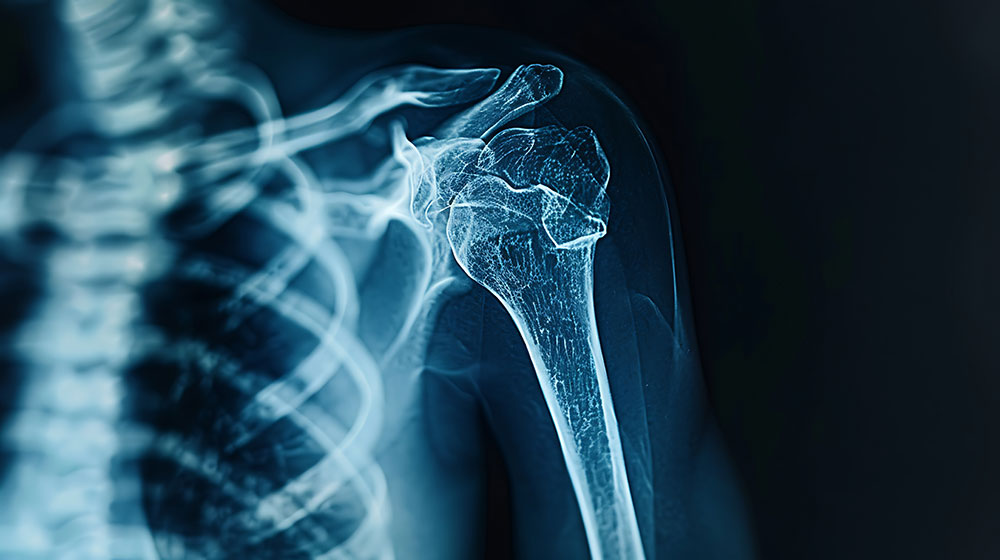
Dr. Richard Cunningham of Vail-Summit Orthopaedics & Neurosurgery (VSON) is a respected shoulder specialist in Colorado with over 20 years of experience, often guiding patients through the critical question: “Will a dislocated shoulder heal on its own, or is surgery necessary?” In this article, Dr. Cunningham explores options for shoulder dislocation treatment without surgery, as well as scenarios that might require surgical intervention.
Understanding Shoulder Dislocation
A shoulder dislocation occurs when the upper arm bone pops out of the shoulder socket, typically due to a traumatic event, such as a fall or sudden impact. Many patients describe this experience as intense, often accompanied by severe pain, very limited shoulder range of motion, numbness, and subsequent swelling. In some dislocations, the shoulder may quickly relocate itself, but the underlying soft tissues may not heal properly leading to future instability and problems. More commonly, the shoulder does not reduce itself and patients have to go to their local emergency room to have the shoulder put back in place with sedation being administered.
Dr. Cunningham explains, “Shoulder dislocations are quite common, particularly in younger, active individuals. In this younger age group, there is a high likelihood of recurrent instability but as we get older the recurrence rate decreases.”
Non-Surgical Shoulder Dislocation Treatment
For some patients, shoulder dislocation treatment without surgery is a viable option, especially if it is one’s first occurrence. Older patients who have a first time shoulder dislocation without any other associated injuries (ie. a rotator cuff tear) can be treated non-surgically with good success and minimal chances of future dislocations. Younger patients (< 30 years old) who sustain a first time shoulder dislocation may also trial a period of non-surgical treatment and see how they do. However, younger patients have a significantly higher likelihood of having future dislocations and/ or subluxations (partial dislocations) which may ultimately necessitate surgical stabilization of the shoulder. Patients should consider consulting with an orthopedic shoulder specialist to determine if a dislocated shoulder can be safely treated with conservative care alone.
Non-surgical management usually consists of a short period of sling immobilization, rest, and physical therapy. Physical therapy is particularly important to reduce swelling and pain, and later to strengthen the surrounding muscles which can enhance shoulder stability.
When Surgery May Be Necessary
In some cases, especially after recurrent dislocations in a young, active patient, surgical stabilization may be the best option. Dr. Cunningham explains, “If you’re experiencing repeated dislocations not only does this limit one’s return to unrestricted sports, but there is worsening damage to the shoulder with each dislocation. In these cases, surgery is recommended to stabilize the shoulder and allow patients to return to sports and limit further damage to the shoulder.”
Surgery involves arthroscopically repairing the torn labrum and torn ligaments in the shoulder as well as addressing an impaction fracture of the humerus that allows occurs with a dislocation. In cases where patients have also chipped away the bone of the shoulder socket, surgery may be needed to rebuild the bone that has been lost from the shoulder socket in order to effectively stabilize the shoulder.
The Path to Recovery
After any treatment, whether surgical or non-surgical, a personalized rehabilitation plan is critical. Dr. Cunningham emphasizes the importance of physical therapy in regaining full shoulder mobility and strength. “Our goal with any shoulder dislocation treatment is to restore function and stability so patients can return to their normal activities without pain or fear of re-injury.”
Consulting with a Shoulder Specialist
If you’ve suffered a shoulder dislocation, consulting with an orthopedic surgeon who specializes in shoulder problems is crucial to making an accurate diagnosis and informing the patient of the best treatments. Dr. Cunningham advises, “Prompt evaluation and a tailored treatment plan are essential to ensure the best outcome.”
Whether you pursue shoulder dislocation treatment without surgery or opt for surgical intervention, Dr. Cunningham and his team at Vail-Summit Orthopaedics & Neurosurgery are here to provide expert care and guidance every step of the way.
